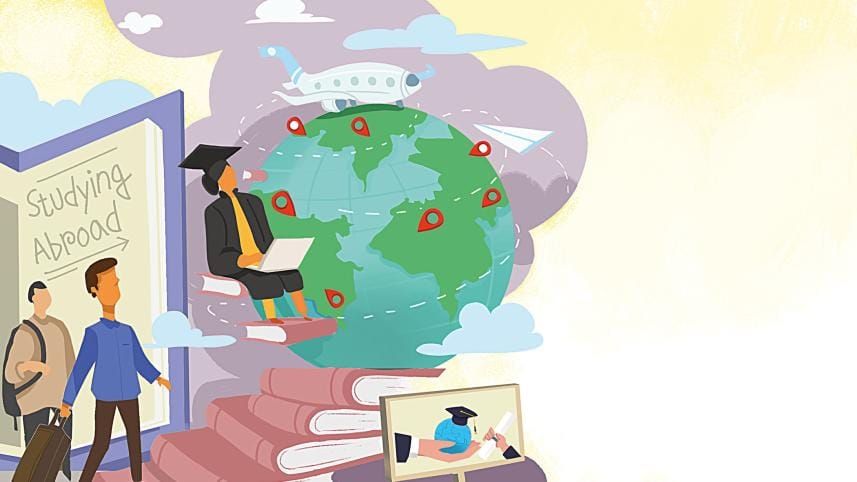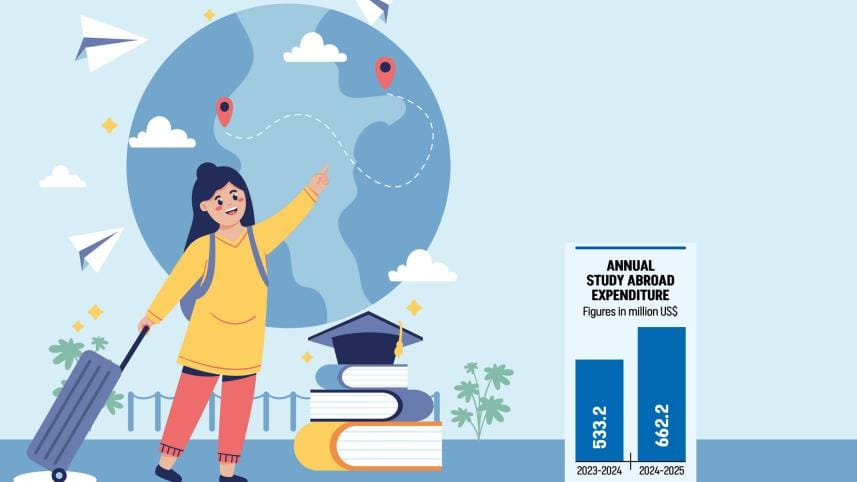From global classrooms to local futures

Many Bangladeshi families view the decision to send their child overseas for higher education as both an act of hope and a step into the unknown. According to Bangladesh Bank, Bangladeshi students spent USD 533.2 million in FY 2023–2024 and USD 662.2 million in FY 2024–2025 on education-related services abroad. In 2023, UNESCO recorded 52,799 Bangladeshi students enrolled outside the country. Further statistics also indicate that the number of students going outside has surged to 2.19 times higher, which is a dramatic rise from a decade ago and a sign that global classrooms are increasingly seen as pathways to opportunity. For Bangladeshi students, this number reflects rising demand for world-class training, stronger career prospects, and the promise of broader horizons.
Early Challenges
Though the opening weeks can be tough, many Bangladeshi students find they brighten quickly. Newcomers often face practical challenges such as managing money, learning to cook, loneliness due to leaving loved ones all of a sudden, and building a support network. However, assistance is readily available from universities, classmates, employers, and local communities. "In the first month I had no idea what to spend money on. It took me around three to four months to learn how to manage my finances," recalled Kazi Niloy, a fresh graduate student from Melbourne. Various statistics also show policy shifts are steering students toward more affordable, student-friendly programmes across Europe and Asia, creating new, welcoming options. With patience and a willingness to ask for help, students regularly discover that work environments and local cultures, even when unfamiliar, are supportive and full of learning opportunities.
"Most of the international students see their foreign education both as a dream and an investment. A degree costing 50 lakh feels wasted if returning home means starting over from scratch. We cannot stop the brain drain until the society as a whole brushes off the things they are subscribed to."
Resilience and Networks
Early hurdles often foster resilience and pave the way for practical learning. Students frequently note that the importance of friendship and networking is irreplaceable. "Strong connections turn campus into a home," explains Samir Ahamed, who came to study in London three years ago. Mentors' Education remains optimistic about the expanding range of options and clearer pathways that assist students in transforming their studies into careers. They stated that roughly 10,000 Bangladeshis study in Australia, 9,000 to 10,000 in the United States, 4,000 in Canada, 4,500 in the United Kingdom, 4,000 in Malaysia, and close to 20,000 are spread across Europe and other Asian nations include Germany, Italy, Finland, South Korea, and China. That spread is now a strength. Stricter visa rules and higher costs in some countries have pushed students to seek scholarships, lower fees, and student-friendly environments in places like Sweden, Denmark, and Finland, which makes home routes more realistic and varied. Bangladeshi students are well-positioned to thrive with practical support, honest counselling, and strong links between universities, employers, and returning graduates.

Reintegration and Credential Recognition
If we are serious about turning aspirations into outcomes, the government must act. They can expand targeted scholarships tied to a required return period. Moreover, they can offer centrally accessible pre-departure seminars before each admissions season, covering money, housing, basic cooking, transportation apps, and workplace rights. Regulating agents and universities and funding post-arrival mentoring is also essential, as clearing credential pathways will make returning graduates employable. Redwan Uz Zaman Reham, an undergraduate at the University of Western Australia, notes, "Living abroad offers safer streets, more reliable services, and a work culture that speeds professional growth." In this way, the daily demands of independence force students to learn practical skills faster, which builds confidence and makes them more career-ready.
Bangladesh's rising cadre of internationally trained graduates is a national asset. With better pre-departure support, a smarter scholarship design, and stronger international partnerships, we can turn individual risks into collective returns. This will help each student not only survive the first month but thrive for a lifetime. The horizon is bright; with the right supports, our young people will reach it with confidence.




 For all latest news, follow The Daily Star's Google News channel.
For all latest news, follow The Daily Star's Google News channel.
Comments